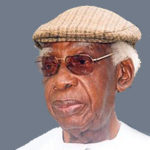Once upon a time – by Gabriel Okara
Check your comprehension. Answer all the questions. If you do not answer any question, you will lose 5 points. There is no negative marking for 'wrong answers'.
Your name and school:
| User | Points |
|---|

Image credit: http://www.african-writing.com
Stanza 1
Once upon a time, son
They used to laugh with their eyes:
But now they only laugh with their teeth,
While their ice-block-cold eyes
Search behind my shadow.
Explanation:
Here ‘Once upon a time’ suggests how people were once, is far from what is being witnessed in the society now. ‘Once upon a time’ is a phrase used in ‘fairy tales’. Maybe the poet thinks that expecting sincerity in people’s actions is like a fairy tale, which is not real.
The poet looks back at a time in the past when people were honest, sincere in their dealings with one another. He regrets the behaviour of the people now. He says that he wants to see the frankness of people that existed long time ago. The poet expresses his sadness comparing his laugh to that of a snake. Teeth are expressionless and they do not express anything. The expression ‘ice-block-cold’ eyes refer to eyes without any warmth. When the poet says ‘people search behind his shadow’, he means that people say things what they do not mean and they are hypocritical.
Stanza 2
There was a time indeed
They used to shake hands with their hearts:
But that’s gone, son.
Now they shake hands without hearts:
While their left hands search
My empty pockets.
Explanation:
The poet uses the words ‘hearts’ and ‘faces’ to refer to emotion. He says that people in the past showed emotions on their faces coming from the heart when shaking hands or when laughing. It is true that we can see the emotion in one’s eyes.
Stanza 3
‘Feel at home!’ ‘Come again’:
They say, and when I come
Again and feel
At home, once, twice,
There will be no thrice –
For then I find doors shut on me.
Explanation:
The poet says that people these days are not sincere when they say ‘feel at home’ and ‘come again. They do not really expect others to go there.
Stanza 4
So I have learned many things, son.
I have learned to wear many faces
Like dresses – home face,
office face, street face, host face,
cocktail face, with all their conforming smiles
like a fixed portrait smile.
Explanation:
The speaker tells us that he has learnt to deal with this fake, insincere world by changing himself to one of those people. Like others, he too hides his real feelings. He says that he has learnt “to wear many faces like dresses” Just like people keep changing dresses to suit different occasions, the poet has learnt to behave differently in different situations.
Stanza 5
And I have learned too
To laugh with only my teeth
And shake hands without my heart.
I have also learned to say, ‘Goodbye’,
When I mean ‘Good-riddance’;
To say ‘Glad to meet you’,
Without being glad; and to say ‘It’s been
Nice talking to you’, after being bored.
Explanation
The poet admits that he has learnt to say what fits each situation instead of speaking the truth. He fakes his behaviour. When he feels like saying ‘Good-riddance’, he says ‘Goodbye’. When he feels like saying ‘Good-riddance’, he says ‘Glad to meet you’.
Stanza 6
But believe me, son.
I want to be what I used to be
When I was like you. I want
To unlearn all these muting things
Most of all, I want to relearn
How to laugh, for my laugh in the mirror
Shows only my teeth like a snake’s bare fangs!
Explanation:
Here ’muting’ refers to ‘changing all the time’. It may also be like the poet has learnt to behave in such a way that it ‘mutes’ or ‘silences’ his real feelings. He tells his son that he wants to get rid of this false laugh showing only the teeth. The comparison of his laugh in the mirror to a snake’s bare fangs brings out the fact that the smile is artificial and might be dangerous. The poet regrets his fake behaviour and so expresses his desire to unlearn all those bad things and learn how to laugh sincerely.
Stanza 7
So, show me, son,
How to laugh; show me how
I used to laugh and smile
Once upon a time when I was like you.
Explanation
The poet asks his son to show how to laugh sincerely. Children do not fake things. They show what they feel inside. Again, the phrase ‘once upon a time’ reiterates the fact that he wants to be what he used to be once.
Very excellent explanation
Thank you, If you are a teacher, please ask your students to take quizzes to get better.
Give the explosions for all lessons for 10th English
Do you mean ‘explanations’? I will be adding them one after the other. It takes a bit of time. Please be patient.
Now I have understood how to match. Thank you, sir.
Thank you for excellent explanation
Thankyou sir for excellent explanation.
Thank you sir for your eloborate explanation.You explained each and every aspect of the poem such as figures of speech,tone and mood of the poem in a very understandable way . Keep rocking sir. Expecting many more videos like this in coming days which we can use in our teaching process.
Thank you.
Good
Excellent quiz
When I first saw the Quiz I was on the verge of just closing it but something changed my mind and I wanted to challenge myself just for fun…And I just scrolled it down after giving the quiz…I am literally surprise to find a jewel here. Thank You so much Sir, your explaination helped me a lot! I hope I can do better in my upcoming exam…
All the best.
Thank You Sir
Sir exllent explanation
This is a good opportunity sir